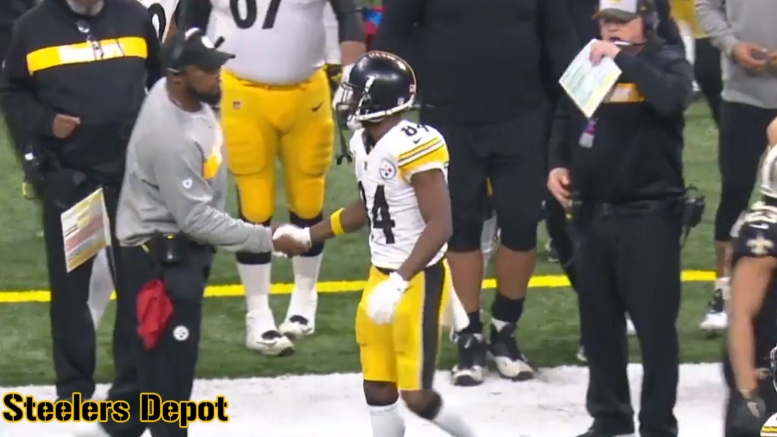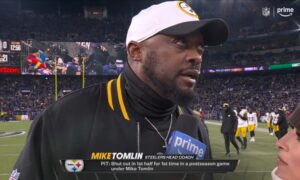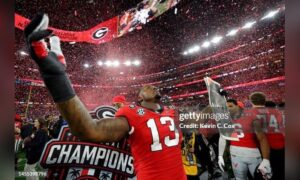For a head coach who during media sessions manages to say a lot of words with little meaning—in other words, he excels at coach speak—Pittsburgh Steelers Head Coach Mike Tomlin has a way of making headlines, intentionally or not, when he’s in a more intimate interview setting. He did so recently when he referred to the departures of Antonio Brown and Le’Veon Bell as a cleansing.
That remark was widely debated in the days that followed. One of his former players, Ryan Clark, also weighed in recently, and given his substantial history with Tomlin, I thought he had an interesting perspective, which he provided during a First Take segment, beginning by recalling his decision not to allow Clark to play against the Denver Broncos in Colorado during the 2011 postseason.
“When I wanted to play in Denver, after I got sick, after they removed my spleen, I went in, I got doctors”, he said. “I had all of these people, a team lined up, because I wanted to play in the playoffs. And I brought all these people to Coach Tomlin and we sat in his room, and there were the trainers and the doctors and I gave this big spiel…of why I could play”.
“I do all this and Coach Tomlin said, ‘I’m looking at you, and if you were my son, I wouldn’t let you play. And that’s my responsibility to look at you as more than a player’”, Clark continued. “And that’s what he did with Antonio Brown, and that’s what he does with Le’Veon Bell, and the only way that works is if you return that loyalty. If you return that in kind”.
The problem is that he was “dealing with players who didn’t see it that way”, Clark said, noting that both Brown and Bell actively ignored Tomlin, including not returning phone calls. “When you’re talking about being an African-American coach, and how you are looked at differently…you also feel a different responsibility; the guys on the team feel like you have a different responsibility to treat them in a certain way”, he added, making a Bill Belichick reference.
“He can treat a guy a certain way. I’ve heard players say, ‘when I walk down the hall, Bill Belichick wouldn’t speak to me’. Or I’ve heard players say, ‘when you see him coming down the hall, you don’t look him in his eyes’”, he said. “That’s okay for Bill Belichick for a black or African-American player. What would it be like if Coach Tomlin was walking [down the hall]? It would be a nightmare”.
I realize that race is a delicate subject to touch on in virtually any sphere, and a football article is certainly no different, but I thought after Clark said it that there is some merit to bringing it into the discussion.
Tomlin is easily one of the most prominent African-American coaches in football history, perhaps even sports history. He is a student of the history of the game, and is socially conscious as well, so I think he’s sensitive to his position on multiple levels, and that informs the decisions that he makes. That includes his legacy within the African-American athlete community.
“The conversations that would be had about him, the way players would feel about him, ‘this is a brother and he’s treating us like this’”, Clark said, going back to the Belichick comparison. “It’s a difficult line to walk. So it’s especially hard when you give players this leeway and you look at them and treat them a certain way, give them certain freedoms because you don’t want to suppress who they are, and they don’t return it, so sometimes you have to cleanse”.
Tomlin seemingly made every effort to allow Brown and Bell, and the rest of his roster, to be their own individual selves as much as was within reason within the football structure. I think it’s fair to venture a guess that he is particularly sensitive to the idea of allowing young African-Americans to be themselves as well, especially in a sport—and on a team—wherein the fanbase is still predominantly white, and which may be unfamiliar or even uncomfortable with that.
This is a deeply rooted perception that goes a long way back, well before Mel Blount sued Chuck Noll for associating him—his own player—with a “criminal element” in the NFL. I quite frankly routinely hear people casually speak of young African-American athletes using terms like “thug” and saying that they would be in prison if they weren’t so athletic.
That’s why I think it’s important to Tomlin and others. And I think that played a role in the manner in which Brown and Bell, and the whole locker room at large were and have been given such freedoms of expression over the course of his tenure. Did he let it get too far? I gather that even he recognizes that now. And I think that’s reflected in his ‘cleansing’ remark.
“For me, I love the transparency of saying ‘you know what, this was a cleansing, this was the way we had to move forward. This is why these guys are no longer here’”, Clark said, and I agree with that. I do think it was a ‘cleansing’, and, given how things devolved, the only way forward. But how that decision will be defined in history is what comes next.








